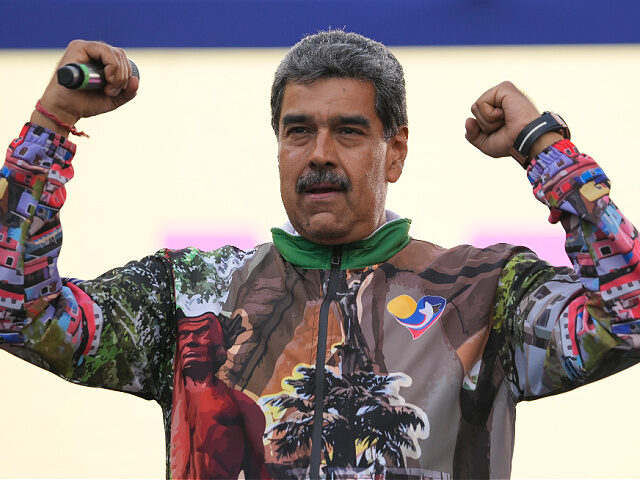Venezuela’s socialist dictator Nicolás Maduro praised U.S. President Joe Biden for dropping out of the 2024 presidential race on Sunday, describing it as a “most sensible decision.”
President Biden announced on Sunday afternoon that he would no longer pursue a second term in the White House in a letter published on social media. He has yet to be seen in public since the announcement at press time.
The decision effectively disenfranchises the 14 million Democrat voters who voted for him in the 2024 primary elections.
Biden offered his full endorsement of Vice President Kamala Harris to take his position on the ticket. Harris notably dropped out of the 2020 primary in December 2019, ending her expensive $39.7 million campaign due to a lack of voter support before any primaries.
Maduro, who himself is seeking to be “reelected” for another six-year term in a fraudulent election, appeared to agree with Biden’s ouster from the ticket in remarks given at a campaign rally event in the Venezuelan state of Barinas. Maduro agreed to an “election” in which he banned all genuine opposition candidates and allowed only a small number of hand-picked leftist candidates on the ballot. Maduro will appear on the ballot 13 times.
“He [Biden] has made the most sensible and correct decision, he prioritized his family, his health and he realized that, at that age and with weakened health, he could not assume the reins of his country, let alone a presidential candidacy. It was a responsible attitude, President Biden,” Maduro said.
The socialist dictator stated that he “knows” Biden and stressed that his regime continues to have a “permanent dialogue” with the Biden administration.
“I only tell you, President Biden, be at ease with your conscience because you made a wise and correct decision and, from Venezuela I, president of the republic, wish you health and long life, President Biden,” Maduro continued.
In recent years, officials from the Biden administration have engaged in several rounds of talks with Maduro regime representatives in a failed effort to convince the ruling socialists to allow a “free and fair” election in Venezuela. The talks have seen Maduro receive several generous concessions from the United States, including — but not limited to — a now-expired six-month oil and gas sanctions relief package, the release of Maduro’s alleged top money launderer Alex Saab, and the release of Maduro’s convicted drug-trafficking nephews.
The United States and the Maduro regime began a new round of talks in early July but have yet to publicly comment on the negotiations by press time.
Maduro rose to power after being personally chosen in December 2012 by his predecessor, late dictator Hugo Chávez, who at the time was suffering from cancer.
Maduro, who was previously best known as Chávez’s foreign minister, briefly served as the late dictator’s vice president following Chávez’s “victory” in the October 2012 presidential elections, in which he defeated opposition candidate Henrique Capriles Radonski. Venezuelan vice presidents are not directly elected by the people but, rather, directly appointed by the president, who can replace them at any time.
Following the announcement of Chávez’s death on March 5, 2013, Maduro acted as interim president of Venezuela following the presidential line of succession while the socialist-controlled electoral authorities prepared a snap election for April 14, 2013. Maduro’s candidacy was not the result of a primary process held by the ruling United Socialist Party of Venezuela (PSUV) but a direct order from Chávez.
Capriles once again ran as the opposition’s candidate for the snap election. Maduro narrowly defeated Capriles by a 1.49-percent vote difference. The controversial election was marred with thousands of documented irregularities that prompted Capriles to formally contest the results. The situation sparked an intense but brief period of protests met with brutal repression from the socialist regime, which left roughly a dozen dead and 270 registered detentions.
Capriles ultimately desisted from further pursuing his claims and called for the protests to end, urging his followers to engage in other activities such as playing salsa music during Maduro’s inauguration instead. Maduro then clung to power by holding a fraudulent presidential election in May 2018 where only handpicked rivals were allowed to run.
Sunday, July 28, will see Maduro “compete” against a handful of hand-picked “opposition” rivals and 74-year-old former diplomat Edmundo González, the only opposition candidate that the regime-controlled electoral authorities allowed to sign up. The upcoming election — which will take place on Hugo Chávez’s birthday — followed the disposal of an agreement signed in Barbados with the opposition in October that called for a “free and fair” election in 2024. The document was signed by both sides under the observation of the administration of U.S. President Joe Biden and Secretary of State Antony Blinken.
Last week, Maduro threatened a “bloodbath” and a “fratricidal civil war” in Venezuela if he is not elected in the sham election. Maduro also claimed that Biden will lift U.S. sanctions imposed on his rogue authoritarian regime once he wins.
Christian K. Caruzo is a Venezuelan writer and documents life under socialism. You can follow him on Twitter here.

COMMENTS
Please let us know if you're having issues with commenting.